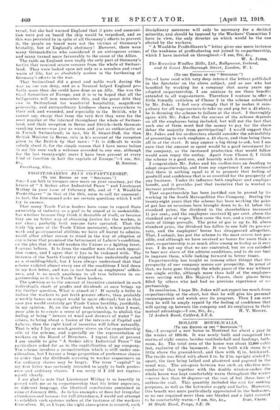PROFIT-SHARING PLUS CO-PARTNERSHIP.
[To THE. EDITOR OF THE " SPECTATOR.") 5:5,-1 am loth to trespass once more on your courtesy, yet the letters of " A Seeker after Industrial Peace " and Lieutenant Withey in your issue of February 8th, and of "A Would-be Profit-Sharer " in that of the 15th, seem to call for comment : in fact, the first-named asks me certain questions which I will try to answer.
That many Trade Union leaders have come to regard State ownership of industry as a goal to he aimed at is undeniable; but whether because they think it desirable of itself, or because they see no better way- of obtaining justice for the worker, is not clear; probably both reasons have operated. That the truly- big men of the Trade Union movement, whose patriotic work and gevernmental abilities we have all learnt to admire, would allow either reason to stand in the way of adoption of soy scheme that promised the betterment of Labour's condition, Olt the plea that it would weaken the Unions as a fighting force, I cannot believe. It is from the smaller men that such opposi- tion comes, and I agree that it has to be reckoned with. The instance of the North Country shipyard has undoubtedly acted as a stumbling-block, but I have always understood that that scheme violated almost every one of the conditions I laid down in my first letter, and was in fact based on employers' selfish- ness, and is as much anathema to all true believers in co- partnership as it is to Trade Union leaders.
The question as to the amount of incentive contained in each individual's sisal.° of profits and dividends at once brings up the fu'rther question, What is aimed at ? If merely a bribe to induce the workers to put forth greater efforts, then probably a weekly bonus on oetput would be lucre effectual; but in that ease you would certainly get Trade Union hostility, justifiably, in my opinion. If, on the other hand, which is what I want, your aim is to create a sense of proprietorship, to abolish the feeling of being " hewers of wood and drawers of water " for others, to bring shout a fusion of the interests of Capital and Labour, then the right kind of incentive will follow naturally. That is why I lay so much-greater stress on the co-partnership side of the scheme, and especially on the repreeentation of workers on the Board of Directors. I regret that at present 1 am unable to give "A Seeker after Industrial Peace" the particulars asked for as to the capitalization of my company. The scheme involves a reeonstruction which is still under con- sideration, but I favour a large proportion of preference shares in order that the dividends accruing to worker co-partners on the ordinary shares may Ise larger. The term "capital" in my first letter was certainly intended to apply to both prefer- ence and ordinary shares. I our sorry if I did not express myself clearly.
I am glad to note that Lieutenant Withey is as heartily in accord with me as to co-partnership that his letter expresses, in different langnage, the identical conclusions contained in mine of January 18th. As to his examples of fines for irregular attendance and bonuses for full attendance, I would not attempt AO establish such systems.unless at the instance of the workers themselves. If, as I hope, the light atmosphere is created, such
disciplinary measures will only be necessary for a decided minority, and should be imposed by the Workers' Committee I have in view, the only director on which would be the ono elected by the workers.
" A Would-be Profit-Sharer's" letter gives one more instance of the weakness of profit-sharing not joined to co-partnership, which I have insisted on throughout.—I am, Sir, Ass
W. A. Jeans.
The Raccview Woollen Mills, Ltd., Ballymena, Ireland, and 11 Great Marlborough Street, London, IV. 1.



































 Previous page
Previous page